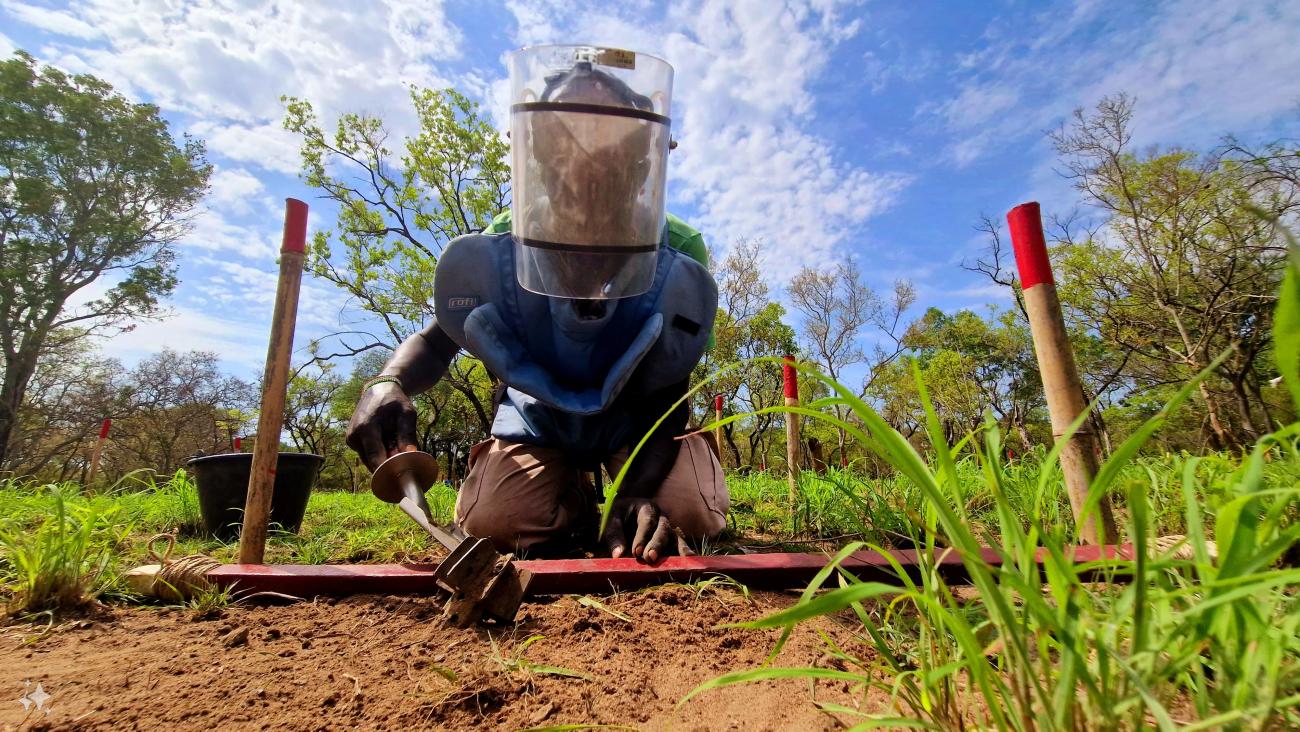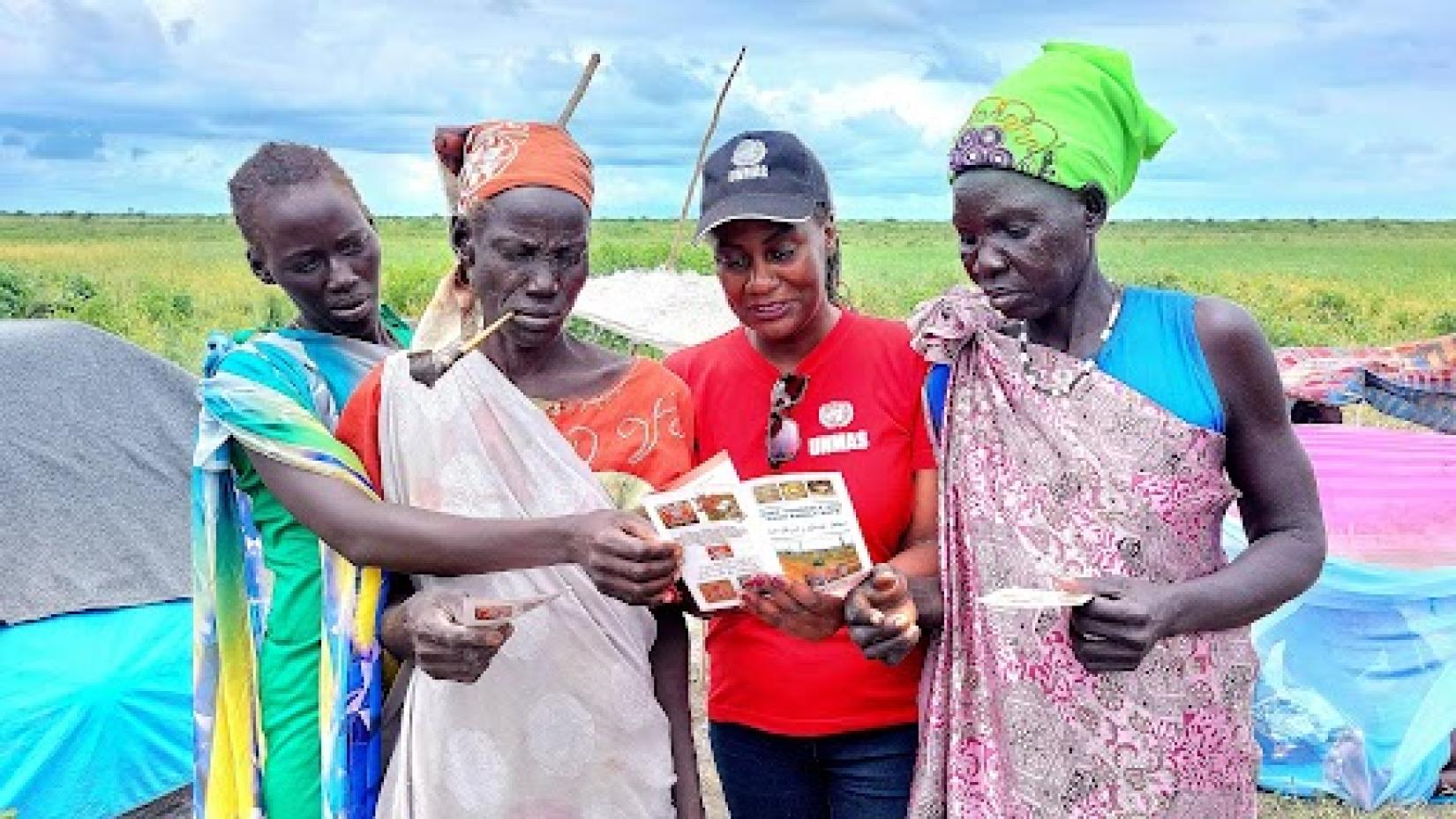Clearing the Path to Progress: How UN Mine Action Supports Sustainable Development in South Sudan

Mine action in South Sudan is more than just removing explosive ordnance. It restores dignity, creating opportunities, and paving the way for development
Every year on April 4th, the world observes International Mine Awareness Day and Assistance in Mine Action, a crucial moment to reflect on the devastating impact of landmines and explosive remnants of war (ERW) and to recognize the efforts dedicated to their removal. Under the theme, “Safe Futures Start Here,” this year holds particular significance for South Sudan as we commemorate over 20 years of dedicated mine action in the country.
In South Sudan, where decades of conflict have left vast areas dangerously contaminated, the United Nations Mine Action Service (UNMAS) plays a crucial role in making land safe and fostering sustainable development. By clearing landmines and ERW, UNMAS saves lives and limbs, and unlocks opportunities for progress in key areas such as agriculture, education, livelihoods, and human settlement. This vital work directly contributes to implementing the Sustainable Development Goals (SDGs), paving the way for a brighter and safer future for all South Sudanese.
Revitalizing Agriculture and Food Security (SDG 2: Zero Hunger)
South Sudan's fertile lands are crucial to achieving SDG Goal 2: Zero Hunger. However, for far too long, landmines and other ERW have severely hindered farming activities. UNMAS, in collaboration with the National Mine Action Authority and mine action partners, has released 15,000 agricultural areas from ERW contamination, enabling farmers to safely cultivate their fields, improving food security at both the household and community levels.
As one returnee farmer from Malakal, Upper Nile State, stated, “It used to be scary to farm here. Now that the mines are gone, we can finally work our fields safely.”
The impact of mine extends beyond immediate agricultural output. Removing these deadly devices has created the conditions for displaced communities to return to their ancestral lands, reconnect with their livelihoods, and rebuild their lives. This return to farming promotes household nutrition and the local economies through the production and trade of agricultural goods. Furthermore, recognizing that clearance of EO-contaminated areas is a slow, long-term process, mine action teams conduct Explosive Ordnance Risk Education (EORE). These initiatives equip farmers, pastoralists and community members with the knowledge and skills to identify potential threats and adopt safe practices, ensuring they can work their lands confidently and without fear.

Enabling Access to Education
The presence of mines and other ERW has impacted South Sudan's access to education. These explosive hazards have rendered many schools and transportation routes unsafe due to contamination. Recognizing that children are naturally curious and playful, often don't strictly follow rules, and tragically constitute approximately 80% of victims of landmines and ERW, the threat to their education is particularly acute. UNMAS has worked tirelessly to clear these hazards, allowing children to return to school in a secure environment. Furthermore, clearance efforts have facilitated reconstruction and expansion projects in areas where essential school infrastructure was previously abandoned due to explosive threats. This fosters a safety culture and allows for increased enrollment and improved learning conditions.
Restoring Livelihoods and Economic Opportunities
Landmines have limited movement, trade, and job opportunities throughout South Sudan. UNMAS has been instrumental in unlocking economic potential by clearing areas contaminated with mines, which are vital for commerce and transport. By removing these mines, infrastructure development, such as roads and marketplaces, has been facilitated, generating employment and revitalizing local economies. Additionally, UNMAS invests in the skills and livelihoods of South Sudanese by providing training and direct employment to local deminers, both men and women. This not only offers sustainable livelihood opportunities for individuals and their families, but also strengthens national technical capacity, supporting a more secure and prosperous future for South Sudan.
Facilitating Safe Human Settlement and Infrastructure Development
Landmine contamination has been an obstacle to the resettlement of displaced people and the development of essential infrastructure. Over the last 20 years, UNMAS and other Mine Action partners, both national and international, have contributed to safe resettlement efforts by releasing 1,300 square kilometres of land, assessing and clearing 4,000km of roads, allowing communities to rebuild homes, establish healthcare centers, and construct roads. Mine action has fostered resilience and long-term stability in South Sudan’s urban and rural areas by ensuring safe passage and access to essential services.
Advancing Peace and Stability through SDG 16 (Peace, Justice and Strong Institutions)
In South Sudan, mine action supports SDG 16: Peace, Justice, and Strong Institutions by clearing explosive hazards that threaten lives, hinder development, and obstruct peacebuilding. Demining has enabled displaced families to return home, resume farming, and restore livelihoods, while road clearance has improved access to humanitarian aid and trade routes. Explosive Ordnance Risk Education (EORE) equips communities with life-saving knowledge, especially children and pastoralists. Working with national and international partners, the National Mine Action Authority (NMAA) strengthens governance and ensures local ownership of mine action efforts, reinforcing South Sudan’s commitment to the Ottawa Treaty. Clearance of roads and infrastructure has expanded economic opportunities and mobility, contributing to long-term stability. By eliminating the remnants of war, mine action lays the foundation for peace, security, and sustainable development in South Sudan.
Mine action in South Sudan is more than just removing explosive ordnance. It is about restoring dignity, creating opportunities, and paving the way for sustainable development.
What is more, mine action not only saved countless lives, but it also enabled humanitarians to reach people in need, peacekeepers to operate safely, and communities to rebuild their lives with confidence.
UNMAS directly contributes to multiple SDGs, making it an essential component of post-conflict recovery and long-term prosperity. As we observe International Day for Mine Awareness and Assistance in Mine Action, it is crucial to continue supporting and investing in mine clearance efforts to ensure Safe Futures Start Here, where all South Sudanese can live, learn, and thrive without fear.
By clearing the remnants of war, we are not just saving lives, we are building the foundations for lasting peace and a safer future for South Sudan.









